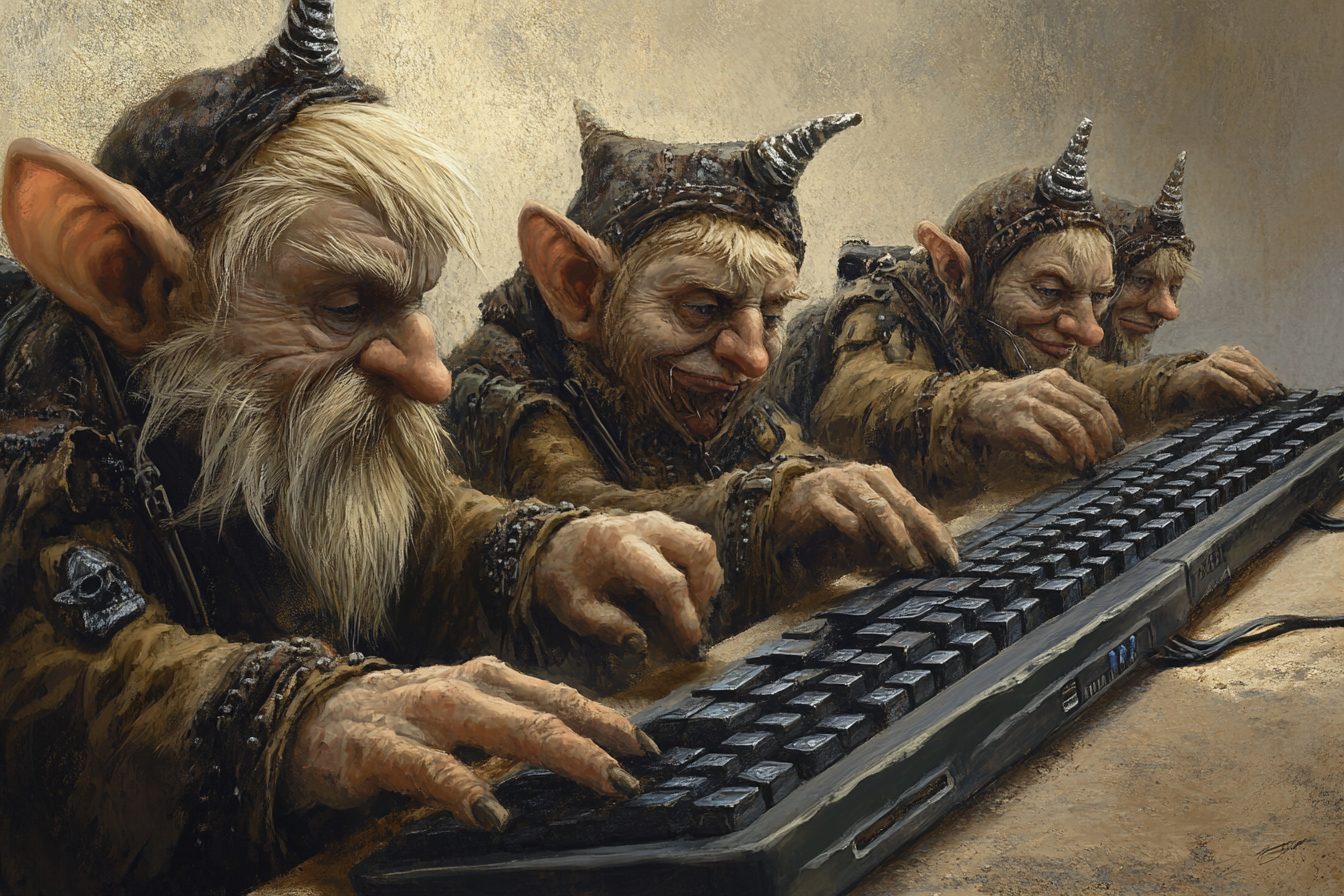I made the mistake of commenting on a news article on Tuesday. I want to clarify that it was nothing controversial, just my take on a local infastructure project that I thought was bonkers expensive. Seventeen minutes later, I had been called a fascist, a comunist, an enemy of progress, and… my favorite, “*boomer with keyboard diarreah*,” by someone calling themselves “TruthWarrior426”
Welcome to the world of online debate, where there is no room for subtelty and everyone’s views are ready for violence.
Once upon a time, not too long ago, we used to need actual human interaction to disagree with one another. You would share your take at a family get together, someone would counter it, and you would have a reasoned argument or not talk to each other for the remander of the night. In any case, basic societal rules stopped most individuals from going as far as calling their uncle’s neighbor a “brainwashed sheep” just because they supported a certain school board candidate.
These boundaries have ceased to exist on the internet, substituted with unrestricted abuse and a race to the top, as the fastest writer on the keyboard becomes “victor” by making the other person give up. I’ve seen normal men and women change into people so far removed from themselves in a beauty pageant no one remebers. They scream and shout holding a mighty weapon of ‘cap lock and exclamation marks’® instead of a sword.
My pal Harold, a former accountant who actually went back to a restaurant because they overpaid him, now spends his mornings trying to find political debates on Facebook. “I’ve got to set these idiots straight,” he claimed to me while having coffee, with his eyes blood shot from arguing with randoms on tax policies at 2AM. Harold, who struggles to update his phone without his daughter’s help, somehow thinks he is saving the political state of America one comment at a time, and I wish I was joking.
What is even more baffling than all of this is how eagerly people want to assume the worst understanding of what you are saying. A month ago, I wrote a comment on an article centered around urban wildlife stating that the local raccoons seem to be too comfortable around people. The same day, I was labeled an advocate for raccoon genocide and got a direct message that just said “MURDERER” forty-seven times.
Which I counted. Then there is the bizarre case of virtue signaling – that style that seems to have developed recently, where people state their opinions for the sake of displaying their moral superiority. I saw my nephew do this during a family dinner, where he interrupted his argument to start typing a 300-word passionate statement about an environmental issue.
When I asked him what actions he was doing apart from typing, he look at me like I just told him to give a kidney. “Raising awareness is action,” he replied before going back to eating his third hamburger of the night. The reality is that most of these online crusades do very little to change people’s minds.
Digital crusades seldom accomplish anything. Research has shown- and my experience confirms- that posting comments or arguing online tends to lead both parties further away from the matter at hand. I have never once witnessed someone retorting to a diatribe posted in caps lock with, ”You know what?
You’ve convinced me. I was utterly wrong.” Yet we seem to keep engaging in this blind activity like a bunch of lab rats pressing a lever expecting the food to reappear like it did long ago. My neighbor Carol opened a Twitter account (or whatever it’s called now) in 2022 to connect with other people interested in gardening.
After three months, she was spending 4 hours a day debating geopolitics with anonymous eagle-headed accounts. When I suggested that this is perhaps not the best way to spend her retirement, she was adamant that she was “fighting the best fight.” Who was she fighting and what was the fight for? These remain unsolved as Carol keeps on her digital warpath while her real garden is overrun with weeds.
It literally doesn’t matter which online issue you chose to concern yourself with, you will always be attacked for not mentioning Issue B to Z. For example, one time, I saw an article about road repairs. The next thing I knew is having to justify my opinion on deep-sea fishing regulations.
In order to connect those ideas, someone would have needed to perform an Olympic long jump. Next, we have the trolls aka those digital ponks who seem to take pleasure in wreaking havoc. The first time I ever came across a troll, I was in the comments section of a banana bread recipe video.
There, I saw people labeling the simple act of buttermilk substitution as ‘utterly foolish.’ Instead of just ignoring this response, I ended up getting into a banter that spanned for hours and even had me being compared to Adolf Hitler. Over the single act of banana bread making. Now that you have this context, let me circle back to my main point.
My first troll experience rattled my hell out, but at the same time helped me fine tune the skills that come in handy when I need to identify a troll. There’s the overly aggressive statement, the sudden shift to focus on personal attacks, and most importantly, the rewording of your message. Man, it’s all so easy to identify and intoxicating at the same time.
But remember though, feeding the beast always increases the hunger. Instead, try everything to avoid confrontation and simply leave in the same manner you came in. Those types of situations are best when they are walked away from slowly.
That way, the ‘beast’ does not feel threatened and counter attack in rage. In my case, that beast is the troll. But what puzzles me most is how these keyboard wars manifest in real life.
My friend Jennifer, who fights every evening on twitter, now views normal conversations in everyday life as battles. It’s sad. During a recent dinner party, she responded to a simple disagreement about movie choices by saying, “Well, actually, if you had done your research,” and then proceeded to monologue for five minutes on a well practiced cadence we know from social media.
The rest of us exchanged silent glances. By the looks, we knew Jennifer’s ability of having normal human conversations was ruined by a lot of online engagement. These online battles also have their phenomenon vocabulary.
Words that once were specific are now used loosely. “Gaslighting” is now a term applied to anyone that disagrees you, “toxic” describes anyone that dares to question you, and “problematic” has become a term used by those that feel like it’s a hassle to give an explainable reason. We are increasingly beating each other up “politically” with no meaningful language, like swordsmen wielding plastic weapons.
The most peculiar combatants in these keyboard wars are those who tackle the offense towards others. A year ago, a comment I made regarding an article from my area’s newspaper which was about a restaurant said, “Excited to experience their ‘authentic’ Italian food,’ made a very angry individual lecture me about my use of the word “authentic” on behalf of Italians. The fact that my grandmother was born in Naples apparently gave me no standing in this debate.
My attempts at getting through this confusing world have been different. For me, the best way was to ignore shouts, which is effective but greatly unsatisfactory. Stating the truth rarely helps because most disputes online exist in a truthless world.
I sometimes use humor, which works very well, although sometimes it is overused and causes loss of subtleties and tone in writing. Asking real questions is what I do now. Statements such as, “What causes you to feel this way?” or, “Can you clarify what you mean by that?” help with achieving actual conversations or reveal the intent behind the attack.
It is regrettable, however, that most of these digital feuds are not meant to convince or enlighten, but rather to put on a show for viewers. We have formed arguments and debate into performances, with each speaker ‘performing’ for the audience rather than engaging thoughtfully with ideas. Participating in this arena is needlessly tiresome, frustratingly unproductive, and dangerously addictive.
It’s as if we’re consuming a whole bag of chips, knowing fully well they have no form of nutrition, and feel good about it. Why do we keep struggling so much then? Maybe there is some deeply rooted desire in human beings to be listened to, regardless of whatever dribble is spewed by them.
Or perhaps, it is much simpler— the likes, comments, or even anger feels good to receive. There is an oddly twisted comfort in viewing the world as purely divided Black and white—good (us) and evil (them). Because of that, whenever I am forced to interact with someone online, I do so with the same wariness and hesitance a person would experience after putting their hand on a hot stove once too many.
I still wander into those dreaded comment sections with the most mild of perspectives and the calmest of tones, hoping for a good outcome. Almost every time, I somehow manage to leave the depths of hell wondering, ‘Why did I decide to do that to myself? Next time, I will definitely only scroll.’
But you and I know quite well that I won’t.
The possibility of hefting myself has strong allure, while the illusion of impact that I make feels profoundly seducing. I will continue to take arms against trolls and virtue signalers with nothing else but my words and wit and dieing patience. And in knowing that in the greater picture of things, none of these digital battles have any significance.
But of course if someone is wrong about banana bread that is worth fighting over.







